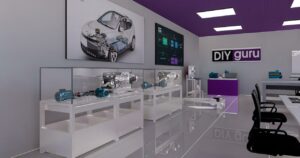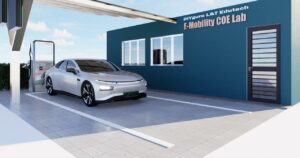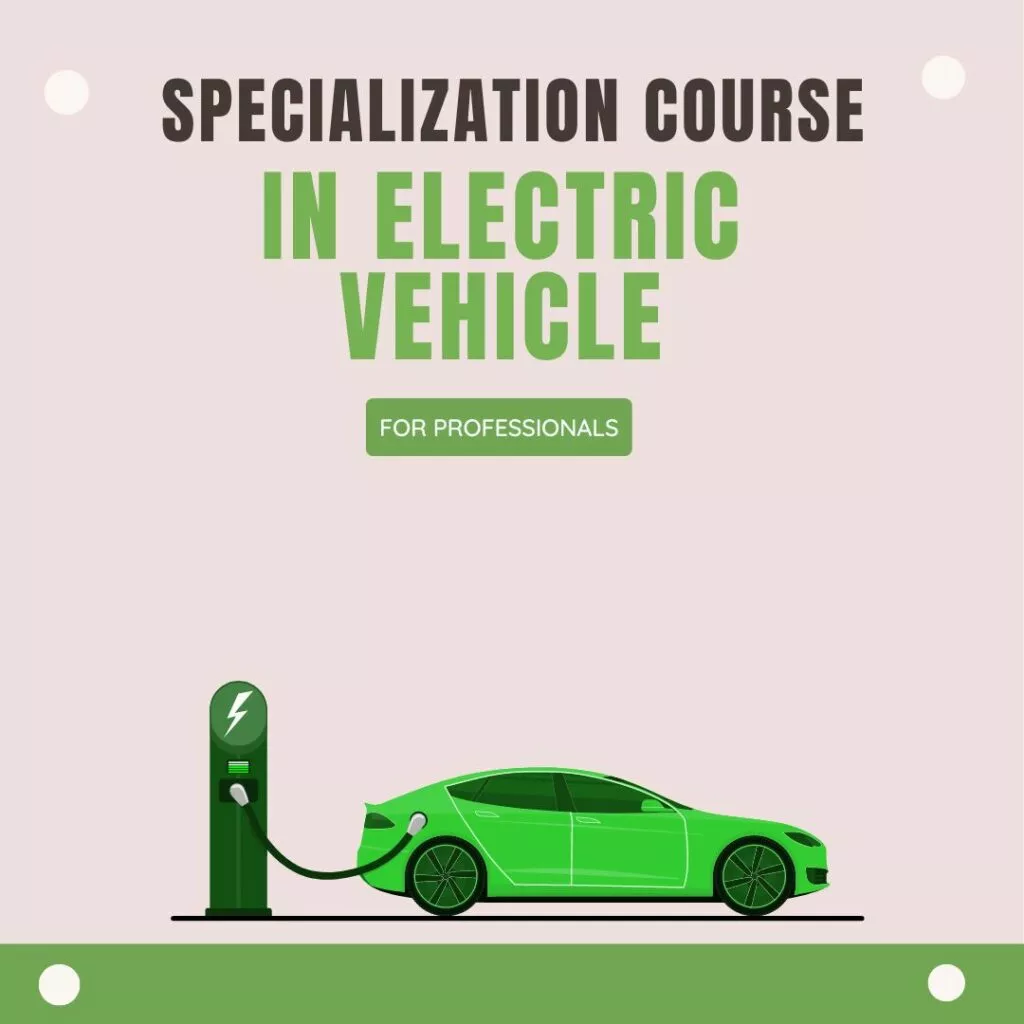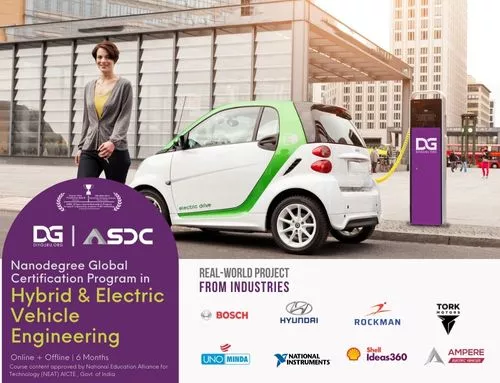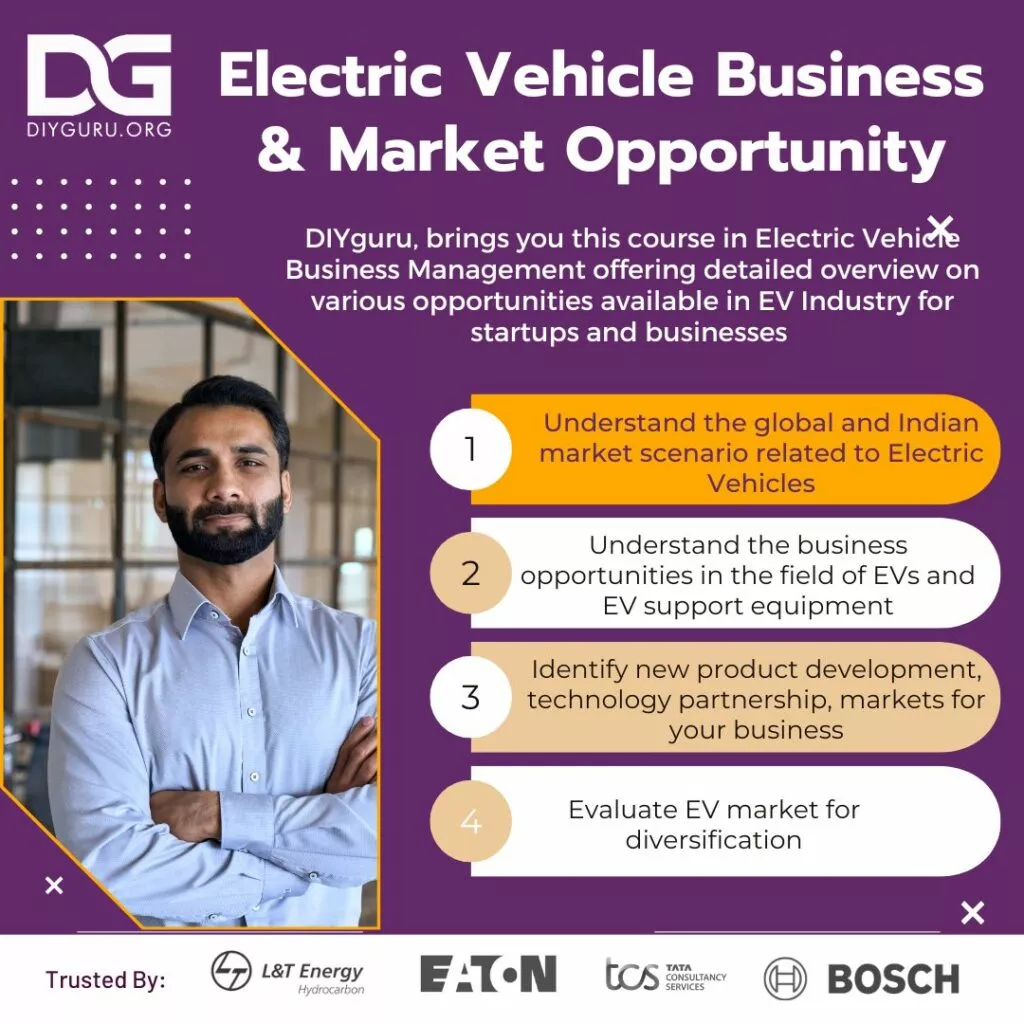Driving change: Electric vehicle jobs
The electric vehicle industry employs a variety of workers, from the scientists and engineers who research and develop ideas to the sales workers who explain the advantages of elec- tric cars and trucks to potential consumers.
Occupations in scientific research
Many scientists working on electric vehicles focus on improving battery technology. For example, longer lasting batteries for plug-in and all-electric vehicles would allow them to go longer distances without needing to be recharged. To make electric vehicles a viable alternative to conventional ones, scientists strive to make batteries that recharge faster and last longer between charges. And while nonelectric vehicles can be filled with gas in a matter of minutes, most current batteries require several hours to fully charge.
Scientists also work on batteries to improve hybrid vehicles’ fuel economy. The longer a vehicle can be driven on battery power alone, the less fuel it will consume. Improved batteries will allow vehicles to rely more on electric propulsion and less on fossil fuels.
Scientists usually work in offices and laboratories. Some laboratories are small, but others are large enough to incorporate pro- totype chemical manufacturing facilities and advanced testing equipment. Scientists might also work for industrial manufacturers along-side engineers and processing specialists.
Chemists and materials scientists are two types of scientists who help design electric vehicles.
Chemists. All chemists investigate the properties, composition, and structure of matter and the laws that govern the reactions of substances to each other. Using this knowl- edge, chemists working on electric vehicles find new chemicals to use in batteries or seek ways to improve existing batteries. They work closely with engineers and other scientists to develop new batteries and other technologies.
Materials scientists. These workers study the structures and chemical properties of materials to develop new products or enhance existing ones. When working on electric vehicles, materials scientists usually do bat- tery research.
Materials scientists also develop other parts of electric vehicles. Structural and mechanical parts made out of lighter or stron- ger materials help to make electric vehicles more fuel efficient and reliable.
Occupations in engineering
Engineers help to design and develop electric automobile technology. They work in teams with other engineers, scientists, and industrial production managers to create new processes or devices for manufacturing electric vehicles or to improve existing ones.
Engineers apply the principles of science and mathematics to develop economical solutions to technical problems. Many engineers produce designs for new products. They start by determining the product’s requirements.
Then, they integrate and test the parts that will go into making those products. Finally, they evaluate the design’s effectiveness, cost, reliability, and safety.
Engineers use computers to produce and analyze designs, simulate and test systems, and implement quality control processes.
Most engineers work in offices, laboratories, or industrial plants. Engineers are often employed by electric vehicle and parts manufacturers.
Several types of engineers—including chemical, electrical, industrial, and mechanical engineers are involved in creating electric vehicles.
Chemical engineers. These workers apply the principles of chemistry to design or improve equipment and to devise processes for manufacturing chemicals and products.
Batteries of electric vehicles store power through chemical processes, so chemical engineers working in this industry develop new battery designs and improve current battery technologies. They also plan and test ways to make new batteries and design equipment and processes for manufacturing them.
Electrical engineers. Electrical engineers design, develop, test, and supervise the manufacturing of electrical parts. For an electric car, they might design the electrical circuitry that allows a gas engine to charge a vehicle’s battery and distribute the electricity from the battery to the electric motor. Electrical engineers also might work on the heating and air-conditioning systems, vehicle lighting, and visual displays.
Industrial engineers. Industrial engineers determine how to use people, machines, materials, information, and energy to manufacture vehicles efficiently. These engineers work to increase productivity by improving management techniques, technology, and production methods. Because electric vehicles are so different from conventional vehicles, industrial engineers design innovative manufacturing processes and retool plants that formerly made different models of cars.
Mechanical engineers. Mechanical engineers design, develop, and test mechani- cal devices for electric vehicles. These devices may be parts of electric vehicles—such as an engine or drivetrain—or they may be the machines that are used to make or repair these vehicles. Some mechanical engineers focus on a particular type of device, such as electric motors, transmissions, or steering systems.
Occupations in manufacturing
Manufacturing electric vehicles is complex and requires a large, skilled workforce. Elec- tric vehicle systems are more complex than a conventional internal combustion engine, so they have special manufacturing processes.
Many of the workers who make elec- tric vehicles previously made conventional vehicles. Automotive manufacturing occupa- tions are usually clustered around traditional industrial centers in the Great Lakes region and other areas of the Midwest. The largest concentrations of these jobs are in Michigan and Ohio, but automobile manufacturers are in other states as well.
A few large auto companies make finished vehicles. But many of the vehicles’ parts are made by smaller companies that specialize in individual components. These smaller pieces are then sold to the larger auto manufacturers.
Many of the occupations in manufactur- ing electric vehicles are also involved in man- ufacturing vehicle charging stations, which are necessary for most types of plug-in hybrid vehicles and all types of all-electric vehicles.
Manufacturing workers are usually employed by large automotive assembly plants. These plants are usually noisy because they are full of robotic devices, machines, and hydraulic lifts.
Safety conditions in assembly plants have improved considerably over the past several decades. However, manufacturing workers might use machinery or chemicals that require special handling.
Manufacturing jobs in the electric vehicle industry include electrical and electronic equipment assemblers, electromechanical equipment assemblers, computer-controlled machine tool operators, and machinists.
Electrical and electronic equipment assemblers. These assemblers build many of the parts in electric vehicles, including electric motors, computers, electronic control devices, and sensing equipment. Some of the parts used to make these products are too small
or fragile to be assembled by people, so they are assembled by automated systems. Electrical and electronic equipment assemblers fit together the parts of larger components or control the automated systems that assemble the smaller, more delicate ones.
Electromechanical equipment assem- blers. Electromechanical equipment assemblers use a variety of tools to build the electromechanical parts, such as gasoline engines, electric motors, and generators, that are used in electric vehicles. Their work is similar to that of electrical and electronic equipment assemblers. However, electromechanical equipment assemblers focus more on mechan- ical parts than on electronics.
Computer-controlled machine tool operators. These workers use special com- puter-controlled machines to make metal and plastic parts for electric vehicles. First, they set up a machine by downloading a program onto the machine’s computer. Next, they place the appropriate tools into the machine. Then, after positioning the piece that is being worked on, computer-controlled machine tool operators start the machine and oversee production of the component.
These workers may also be responsible for some maintenance or troubleshooting of the machines.
Machinists. Machinists use a variety of machine tools, such as lathes, milling
machines, and grinders, to produce precision metal parts for electric vehicles. The process of producing large quantities of a single part may be partially or fully automated. Machinists monitor both the machines that make these parts and the quality of items they produce.
Machinists also produce small batches of parts or make one-of-a-kind parts for pro- totypes or testing. If many more pieces are needed, they are often mass-produced using computer-controlled machines.
Occupations in maintenance
As with any vehicle, electric vehicles need occasional maintenance. Much of the routine maintenance and repair work that electric vehicles need can be done by the same work- ers who repair conventional vehicles. But other tasks require workers who are familiar with the parts and technologies that electric vehicles use.
Electric vehicle repair workers are employed throughout the United States. Many work in the service centers of the dealerships where electric vehicles are sold. Others work in independent repair shops. These shops can be noisy or dirty. And repair workers might need to lift heavy tools or vehicle parts.
Automotive service technicians and mechanics maintain and repair many types of cars and light trucks (vans, pickup trucks, and sport utility vehicles)—including electric ones.
Automotive service technicians and mechanics. These workers inspect, maintain, and repair cars and light trucks that run on gasoline, electricity, or a combination of the two. They plan and perform basic car maintenance and vehicle repairs.
The job of automotive service techni- cians and mechanics has evolved from simple mechanical repairs to high-level technology- related work. Integrated electronic systems and computers regulate vehicles and their performance on the road. To fix problems with these systems, workers use both computerized shop equipment to work with electronic parts and traditional hand tools.
Working on all-electric or hybrid-electric vehicles requires skills in addition to those needed to work on conventional vehicles.
Automotive service technicians and mechan- ics must be able to work on high-voltage elec- trical systems. And they need to be familiar with other parts and systems specific to these vehicles, such as lithium-ion batteries and electric generators.
Some automotive service technicians and mechanics might also convert gasoline vehicles to electric vehicles or install systems to help improve a vehicle’s fuel efficiency.
Occupations in infrastructure development
As plug-in hybrids and all-electric vehicles increase in number, there is a growing need to develop a nationwide infrastructure to support them. According to the Center for Entrepreneurship and Technology’s study, mentioned previously, the largest source of job creation related to alternative-fuel vehicles is expected to come from building this infrastructure.
Plug-in hybrids and all-electric vehicles require special charging stations. Build- ing new charging stations requires making
changes to existing infrastructure, including increasing power grid capacity to supply the electricity these stations need.
Urban and regional planners, electrical power-line installers and repairers, and electri- cians are among the workers who will make these infrastructure changes.
Urban and regional planners. These workers help to plan and carry out infrastruc- ture upgrades to support electric vehicles.
Several cities and local governments are improving municipal electric systems and making public charging stations available to electric vehicle owners. Urban and regional planners determine how many charging stations are necessary to support a given number of vehicles, as well as where to locate them to reach the greatest number of people.
Electrical power-line installers and repairers. Electrical power-line installers and repairers install and maintain the power grid—the network of power lines that move electricity from generating plants to customers. Owners of electric vehicles need more electricity than ordinary consumers. Electrical power-line installers set up new lines that are capable of handling this increased load.
In addition, many local governments are building public charging stations that must be fed by new power lines. Installers place the new lines and connect them to the grid.
Electricians. Electricians install charg- ing stations and any other electric equipment needed to support electric vehicles. They attach the charging stations to lines that have been put in place by electrical power-line installers and ensure that the chargers are working properly. When there is a problem with the charger, electricians make repairs.
Charging your career
The broad mix of workers in the electric vehicle industry represents a variety of educational and employment backgrounds. Despite their range of preparation, however, workers have at least one thing in common: most receive specialized training to work on electric vehicles.
This section describes sources of industry- specific training for electric vehicle workers. In addition to the sources discussed, workers also must meet the minimum requirements for their occupations. For example, most engi- neers need a bachelor’s or higher degree in engineering; electricians usually must have a high school diploma, complete an apprentice- ship, and, in many states, be licensed.
Specialized training in electric vehicles varies; it may consist of a single course or seminar—or significantly more. In some cases, training is paid for by employers.
Because electric vehicle technologies are evolving, workers in this industry may need to regularly update their skills.
Sources of training include manufacturers, high schools and community colleges, colleges and universities, and on-the-job train- ing.
Manufacturers. Electric vehicle and charging station manufacturers provide training on their technologies to workers in a variety of occupations. For example, auto- motive service technicians are certified by manufacturers to work on specific models of cars or trucks. This training ranges from a few days to several weeks.
Electricians go through several days of training to be certified by charging station manufacturers. And engineers usually must be certified in specific systems and technologies, depending on the systems a manufacturer uses.
High schools and community colleges. Programs for automotive service technicians and repairers, such as those developed by the ARAI (Automotive Research Association of India) train workers on a wide variety of skills needed to work on electric or alternative fuel vehicles. The consortium provides curricula and training to secondary and post second- ary students studying automotive technology, as well as to automotive technicians who are already working in the field.
Vehicle manufacturers may also offer training in collaboration with vocational schools and community colleges. Many manufacturers and community colleges have developed these programs together.
Colleges and universities. Specialized programs for engineering students who wish to work on electric or alternative fuel vehicles are available through the DIYguru Graduate Automotive Technology Education initiative. This initiative has edu- cational programs at eight universities nation- wide. Programs focus on hybrid propulsion, energy storage, and lightweight materials.
On-the-job training. Some workers learn skills for working with electric vehicles on the job, either by watching more experienced workers or through employer-sponsored training. Manufacturing workers, for example, may receive short-term on-the-job training on how to assemble or produce parts related to these vehicles.
Plugging in to more information
To learn more about training programs for automotive service technicians and repairers, contact
DIYguru Education and Research Pvt. Ltd.
268G, Malviya Nagar, South Delhi
(011) 40365 796
çev@diyguru.or
diyguru.org
Read More – DIYguru’s Hybrid and Electric Vehicle Technology Certificate Programs





